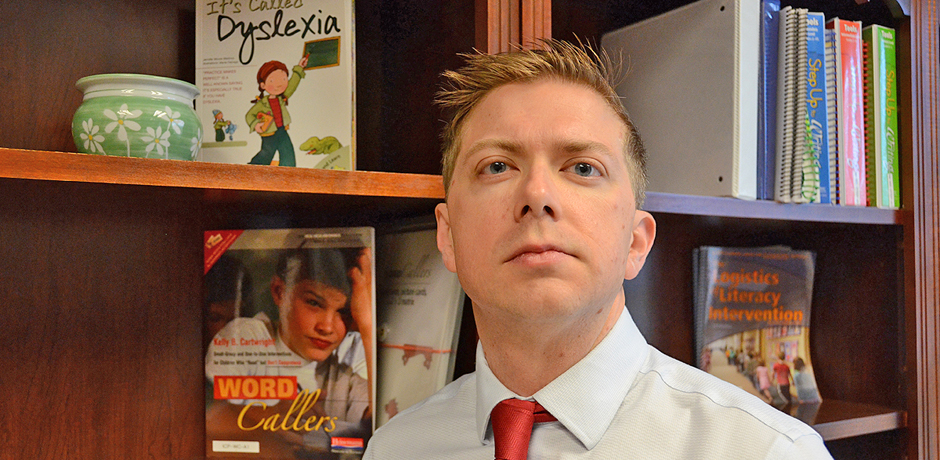Now a few months into his new position as chair of the MTSU’s Dyslexic Studies department, Dr. Timothy Odegard has eagerly embraced his role “to provide a guiding light” for the Tennessee Center for Dyslexia on North Baird Lane.
In November, Odegard was named the Katherine Davis Murfree Chair of Excellence in Dyslexic Studies, a professorship created in 1989 that is part of the MTSU College of Education. The Center for Dyslexia was established in 1993 to develop workshops and student assessments for K-12 teachers and support MTSU graduate programs in related fields of study.

Dr. Tim Odegard, shown here inside the Tennessee Center for Dyslexia on North Baird Lane, was named the Katherine Davis Murfree Chair of Excellence in Dyslexic Studies in November 2015. (MTSU photos by Jimmy Hart)
The chair’s purpose is to enhance the skills of teachers, school psychologists, and parents to more effectively identify and assist dyslexic students. The position is also tasked with contributing to research about how best to address this learning disability in which some people have extreme difficulty learning to read and spell.
“One of the goals that I have been working with Dean (Lana) Seivers and others to explore is our ability as a center to go back to our roots a bit and to start offering some very structured, more formal and intensive teacher trainings,” Odegard said, adding that such training would occur on and off campus and could include virtual training opportunities as well.
He will work closely with Dr. Jim Herman, director of the Center for Dyslexia, in establishing partnerships with surrounding school districts.
The center could then eventually expand those efforts across the state to help and support teachers and educators “who are in our schools and interacting with these children and they’re feeling overwhelmed,” he said.

Dr. Lana Seivers
That likely means changing reading and literacy instruction within classrooms to meet the needs of dyslexic students. As a developmental cognitive psychologist, Odegard has pursued research that focuses on memory and language as well as incorporating experimental methods and neuroimaging to understand the development of these aspects of human cognition.
“Good, solid reading intervention seems to be effective for a lot of kids,” he said, noting that he hopes to expand his research in neuroimaging and intensive instruction.
Odegard’s research works to identify factors that predict the response of individuals with dyslexia to “intensive multisensory” reading instruction. He’s hoping to do collaborative research at MTSU with other faculty who are also interested in the topic or who may have had previous connections to the center and its mission.
Odegard completed the two-year dyslexia specialist training program at Texas Scottish Rite Hospital for Children in Dallas, Texas. He also completed a supervised practicum during his training, where he provided multisensory reading instruction in small group and one-on-one settings under the supervision of qualified instructors at the hospital.
Odegard, who regularly speaks across the nation on topics related to dyslexia, is a Certified Academic Language Practitioner. He presented some of his research at a recent literacy conference at MTSU based on his study of neuroimaging in Texas.
“It’s an emerging field of research,” he said. “The reality of reading and literacy and developing these skills is that there’s a gene, brain, environment interaction that we’re slowly unraveling across many labs in the country.”
Odegard said a longer-term goal is to work toward fulfilling the Tennessee Center for Dyslexia’s vision “to create information and become clearinghouse for reliable information on dyslexia and related reading disabilities and how they relate to literacy in general.”
The center will be working with the MTSU Center for Educational Media to create and make available short, topical videos that are teacher and parent friendly while also seeking partnerships and collaborations with allied organizations to hold or host events related to dyslexia.
For more information about the Murfree Chair of Excellence or the Dyslexic Studies courses, call 615-898-5642 or visit www.mtsu.edu/dyslstud.
— Jimmy Hart (jimmy.hart@mtsu.edu)

Dr. Tim Odegard, shown here outside the Tennessee Center for Dyslexia on North Baird Lane, wants to raise awareness about MTSU’s Dyslexic Studies program.


COMMENTS ARE OFF THIS POST